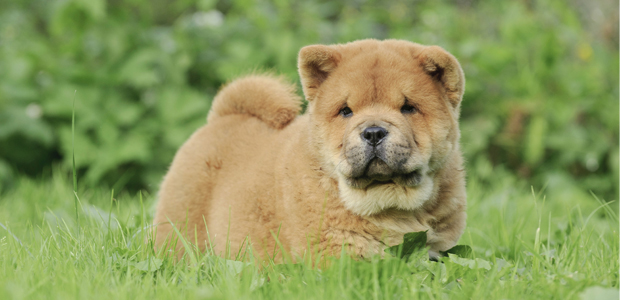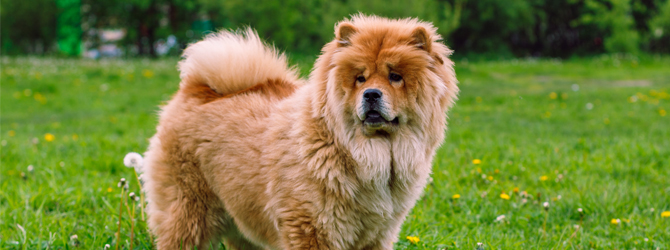The Chow Chow: is it the right breed for you?
The Chow Chow is well known for their super soft teddy bear-like appearance and independent personality. One of the oldest dog breeds in the world, the Chow Chow's origins stretch back to ancient China.
Interestingly, Chow Chows have a bluey/black tongue and their tendency for aloofness has drawn many comparisons with the personalities of house cats.
Chow Chow Summary:
- Independent breed with a blue/black tongue.
- Coat types include rough and smooth
- Common colours include fawn, cream, blue & black
- Chow Chow life expectancy = 9 - 13 years
- Average size = 43 - 50 cm
- Average weight = 20 - 30 kg
- Estimated monthly cost = Medium
- Exercise needs = Medium
- Attention needs = Low
- Sociability = Low
Please note: A dog’s exercise, training/stimulation and grooming requirements can depend on several factors such as age and health. The same goes for ongoing costs of ownership. For advice on one specific dog, we always advise chatting with a vet.
How much exercise do Chow Chows need?
Although they aren’t high energy dogs, Chow Chows enjoy going for walks. They need between 45 - 60 minutes of exercise a day, which can be broken up into a shorter walk in the morning and a longer, more interesting walk later in the day.
To keep them happy and healthy, take them to a secure environment where they can run off-lead, with lots of interesting things to see and sniff. As with all breeds, be careful not to over-exercise them whilst they are still growing, as this can have long term effects on their joints.
Chow Chow dietary requirements
Your Chow Chow will need a balanced diet rich in nutrients, vitamins, and minerals. It’s best to feed them complete dog food to ensure that they are getting the right amount of vitamins and nutrients.
Growing pups may prefer 3-4 smaller servings during the day, rather than two larger meals. This can be reduced to two meals a day as your dog gets older.
The recommended portion size will depend on your individual dog. You’ll need to take into account their activity level, age, and metabolism. To avoid weight gain, make sure your Chow Chow has a healthy and balanced diet and gets plenty of exercise.

Training: how to train a Chow Chow
Because of their independent nature, training a Chow Chow requires lots of patience. Make sure you’ve got lots of rewards, including high value treats, to give them a good reason to make the right choice when they’re training.
Chow Chow’s are happiest when they’re given clear boundaries and rules, so they know what is expected of them. It’s best to train your Chow Chow puppy in short sessions with lots of rewards. If you’re training an older Chow Chow, it will take more time because they will have developed a more independent streak.
Grooming: do Chow Chows shed?
Chow Chow’s have two coat types, rough and smooth. The rough coat is thicker and fluffier, with the hair forming a ruff or mane around their neck. The smooth coat is dense and smooth without a ruff on the neck. They are heavy seasonal shedders.
Owners will need to give their coat a quick daily brush, with a more thorough brush once a week. You can get them used to this by starting the process when they’re young, working it into their daily routine. Brushing provides a great opportunity to bond with your dog.
You’ll also need to bathe your Chow regularly. Remember to use specialist bath products on your dog, your vet can advise further. Complete your Chow Chow’s grooming routine with regular tooth brushing, nail clips and ear checks.
Cost of owning a Chow Chow
When considering the lifetime cost of owning a Chow Chow, remember to take into account the following costs:
- Nutritional needs of dogs
- Veterinary care
- Pet insurance
- Kennels or dog sitters
- Regular Chow Chow grooming
- Toys and equipment
- Preventative healthcare
As a rough guide, allow between £100 and £150 a month to cover the ongoing costs of owning a Chow Chow. Our vets have drawn up this handy guide to save dog owners money.
Are Chow Chows prone to any health problems?
Chow Chows are prone to certain health problems, just like all breeds. This doesn’t mean your dog is guaranteed to contract any particular disease – it’s just something to bear in mind.
To keep your Chow as healthy as possible, monitor them closely and attend routine 6-month health checks with your vet. This will allow the vet to give your dog a thorough check-up and to pick up on minor (often symptomless) conditions before they have a chance to escalate into something worse.
Possible health complications for Chow Chows Include:
- Canine dental issues and gum disease
- Infections
- Obesity and weight problems in dogs
- Allergies (including flea, food and pollen)
- Hip dysplasia
Before welcoming a new dog into your household, make sure you’re able to cover the costs of any routine or emergency medical treatment they may need. Pet insurance will help massively with this. Why not ask your vet about their recommended pet insurance policy?

Chow Chow temperament, socialising and ideal home environment
As mentioned, the Chow Chow is a free spirited breed that can be aloof. However, if trained and well socialized, they can be dedicated and loyal dogs. Famed for their good manners, the Chow Chow is an intelligent dog that is easy to house train.
Chow Chows are an independent breed, so if you’re looking for an affectionate lap dog, this probably isn’t the breed for you. They don’t really like being made a fuss of, or enjoy heavy handed petting or play, and they can be wary of new people. It’s also common for them to form a strong bond with only one person.
Chow Chow’s benefit most from houses with lots of indoor and outdoor space, with large gardens providing a secure space. That said, providing your pet is well exercised, they’ll be comfortable in a smaller space.
Not the most adventurous breed, they don’t typically enjoy getting their feet or fur wet, so if you want a companion to join you on hikes and outdoor adventures, a Chow Chow might not be for you.
Are Chow Chows suitable for first time owners?
Having previous experience with the breed is recommended before committing to getting a Chow Chow. They need to be handled in the correct way and training can take a lot of commitment, because of their strong will.
If you aren’t able to dedicate many hours to training, then your Chow might not receive the attention and care it needs to become a well-rounded dog.
One of the things to bear in mind when deciding whether to get a Chow is that they can become really attached to their owners. This means that they can display separation anxiety when they are left on their own.
Need more info?
For more info on finding the best dog breed for you and your lifestyle, have a chat with your vet. Find your nearest vet using our Find a Vet page.

